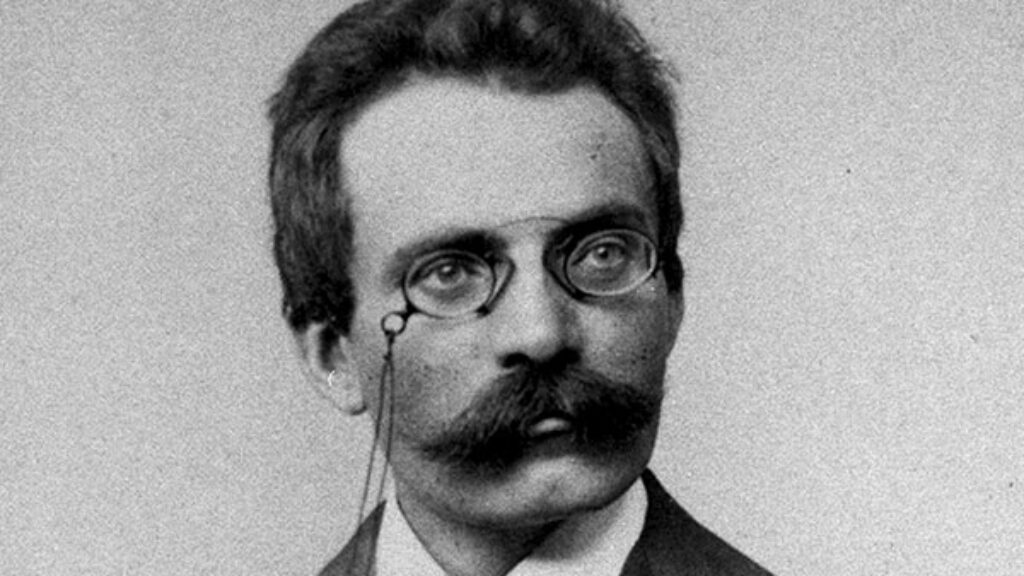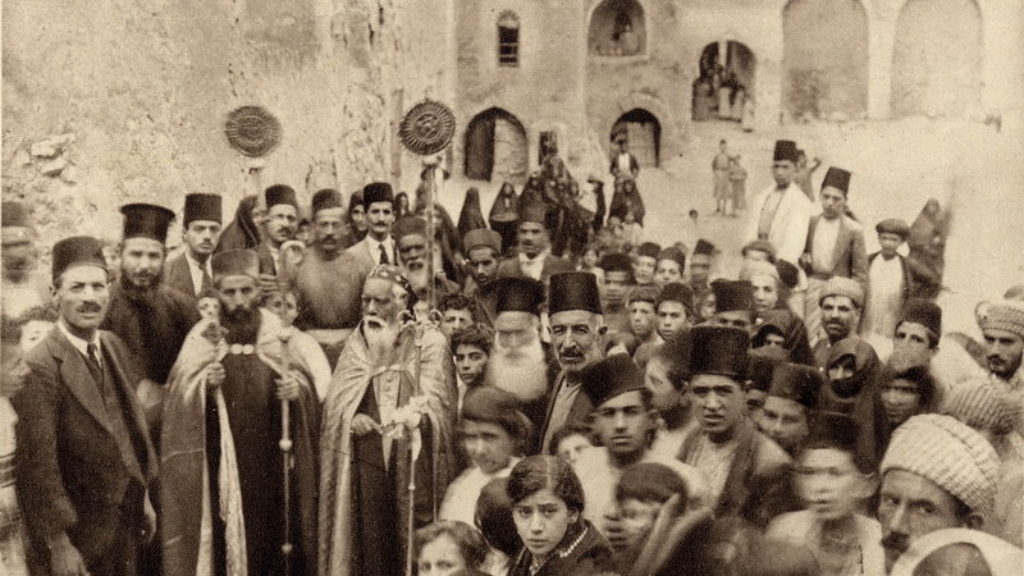At the Anti-Israel Carnival
I was taken aback the first time I saw a student in costume this past fall at Rutgers University. She turned up to a lecture on a November afternoon wearing bright green pants and a red, white, and black Fair-Isle sweater. Most remarkably, she had dyed her hair the fire-engine red of a clown wig. It took me a moment to realize that she had remade herself in the colors of the Palestinian flag. Her costume announced her solidarity with the Palestinians of Gaza, but she was also dressed for a carnival.
One of the most striking aspects of the campus protests against Israel’s war against Hamas is the apparent gleeful audacity of many of the protesters. They ignore Hamas’s brutal spree of murder, rape, torture, and abduction on October 7 and decry Israel’s response as itself genocidal. Such stark incongruity and rhetorical inversions are a mark of what the Russian literary theorist Mikhail Bakhtin famously called “the carnival sense of the world.” Conventions are dissolved, social roles are reversed, and hierarchies are undone. Bakhtin saw medieval and early modern carnivals as harbingers of freedom. As he explained in Rabelais and His World: “The carnival spirit . . . . frees human consciousness, thought, and imagination for new potentialities. For this reason great changes, even in the field of science, are always preceded by a certain carnival consciousness that prepares the way.” Bakhtin reveled in the profane irreverence of the carnival spirit, but it always had its dark side, in which truths are denied and morals are violated amid the chaos.
Anti-Israel protests on university campuses have taken on dark aspects of the carnivalesque. Three features stand out in the protestors’ words and deeds: their use of masks and costumes, their inversions of facts and ideals, and their celebration of violence. Each of these features has been deployed to sow chaos and intimidate reasonable people into silence. As co-chair of Rutgers JFAS (Jewish Faculty, Administrators, and Staff), a grassroots group of Jewish employees that seeks to promote a supportive environment for Jews on campus, I have had a front-row seat to much of this behavior.

While the student with the fire-engine-red hair was clearly seeking attention, signaling her fashionable politics through her outlandish outfit, other students have adopted different costumes for different purposes. For instance, surgical masks preserve anonymity while conveying a sense of menace. Other student protestors, including non-Muslims and non-Arabs, have begun wearing keffiyehs not only to protests, but also to class, with the garment covering their entire faces except their eyes. Jewish students have told me that they have been “stared down” by their classmates in this garb.
More disturbing than costumes are the carnivalesque inversions of ideals central to a university education. Thus, when JFAS has sought co-presenters for lectures by entirely mainstream scholars, we have struggled to find a single academic department willing to put its name on a poster. On the other hand, those same departments and university-sponsored research centers present seemingly endless, one-sided propaganda that vilifies Israel. Even the concept of “diversity” is blatantly inverted. In February, a university-sponsored research center hosted a lecture by Omar Shakir of Human Rights Watch, who is notorious for demonizing Israel. During the Q&A period, a professor began by saying: “I am speaking as an Israeli, I am speaking as a Jew, and I am speaking as a Zionist. . . . We are here. We want to talk, and we look forward to talking about this issue and all issues with all of you.” The Jewish professor was interrupted and heckled. Later, Students for Justice in Palestine posted a video of the incident, asserting, “This is extremely unprofessional, insensitive, & makes his students and many students across the Rutgers Newark campus feel unsafe.” Dozens of comments on the post predictably agreed that a request for dialogue was really an act of violence, with some stating openly that the diversity of the student population was reason to silence Zionists.
A main feature of the carnivalesque is its celebration of the carnal or profane. True to form, campus protestors have consistently celebrated actual bodily violence. Everyone is, by now, familiar with the rationalization and even cheering of Hamas’s atrocities on October 7. Even more shocking was the promotion of violence that took place at a protest here at Rutgers in January. Shouting into a megaphone, a leader of the protest glorified precisely such violence when she proclaimed, “dying as a Martyr, dying as a hero is one of the greatest sacrifices you can do as a Palestinian and as a Muslim.” She then led a series of chants in Arabic: “Even if you aren’t Muslim, if you say these chants, you are resisting on behalf of the Palestinians.”
Like many cultures, Judaism has its own spring carnival in the holiday of Purim, with all its mandated excesses, masks, and inversions in celebration of the defeat of Haman and his allies. Over the centuries, the rabbinic tradition has been largely successful in curbing and sublimating the darker aspects of the carnivalesque in the service of its higher ideals. Yet Jews are not immune to the violent excesses of the carnivalesque; witness Baruch Goldstein’s massacre on Purim in 1994. Especially now, as Israel’s justified, defensive war against Hamas is being sullied by unsanctioned violence by extremist Jews in the West Bank, we all bear responsibility for ensuring that the levity of Purim is channeled toward “light and joy,” to borrow a phrase from the Book of Esther.
Mikhail Bakhtin thought that the chaotic spirit of the carnival would “free human consciousness, thought and imagination for new potentialities.” Perhaps. But the university is an institution carefully constructed over centuries to advance consciousness, thought, and imagination through the free and open pursuit of truth. It will have to find a way to reject masked intimidation, brazen inversions, and the celebration of violence if it is to remain one.
At Rutgers and on countless other campuses nationwide, the carnivalesque has given license to an ugly hatred that has now been unmasked. Undoing the inversions, lies, and base behavior that this hatred has engendered will require a renewed commitment to the central mission of American colleges. My university would be a good place to start.
Comments
You must log in to comment Log In
Suggested Reading

Return without Returning
In Micah Goodman’s new book, The Wondering Jew, he argues that Israeli Jews should develop a relationship with Jewish tradition that falls somewhere between strict adherence and total abandonment.

Where Abraham Walked
Preserved for centuries by Syrian Christians, spoken-Aramaic is now breathing its last.
Letters, Summer 2021
Mitzvot and the Modern Dilemma; Tzuris Spoiled?; Hill 24’s Answer; Vilna Gaon, Zionist?
Old-New Sabbath
Does everyone need a Sabbath? Judith Shulevitz thinks so.
Alison Wechsler Cipriani
There is no extremist violence in Judea/Samaria. The violence is a terrorist being killed while trying to kill and Israel. That is what the Biden administration now considers settler violence. Actually "settler" violence is lower this year than in previous years. Don't let this administration hijack you. Check facts!!! And that doesn't mean reading another newspaper it means going to the sources and reading the differing accounts. Then maybe you'll find the truth. And why are they called settlers anyway? Why aren't the arabs settlers? Another good question.
Matthew Friedman
As one of your colleagues at Rutgers University (in the History Department at Newark), I find this article interesting, since I have not experienced anything remotely similar to what you relate. As you know, RU-N has a much higher proportion of Muslim students, many with direct connections to Palestine. I see students in keffiyehs all the time, and they see me - a bearded man wearing a yarmulke - all the time.
But your complaint seems to be that the students to whom you object are anti-Israel (and presumably anti-Zionist). Apart from noting that one professor was heckled after declaring "I am speaking as an Israeli, I am speaking as a Jew, and I am speaking as a Zionist," you don't report on any incident where a Jewish professor or student has been harassed in any way that might be understood as antisemitic (apart from reporting "glares"). And was this professor heckled because he was Jewish, or because he explicitly identified himself as an Israeli and a Zionist? You don't say, nor do I believe that you can say, unless you also claim to be able to read minds.
The bottom line is that there are a lot of people out there who are very angry at the State of Israel, whose invasion of Gaza has killed 32,000 people (almost 30 times the number of Israelis who were killed in the 7 October attack). Are you suggesting that there is something illegitimate about being angry about and critical of a sovereign state? Perhaps you are saying that all states should be beyond criticism and protest -- I really can't tell.
Was it illegitimate for my parents to protest the treatment of the refuseniks by the Soviet Union in the 1970s (they brought me along to the protests)? Was it illegitimate for me to march in anti-apartheid protests in the 1980s, and to demonstrate against the Russian invasion of Ukraine in the last few years? Perhaps you want to say that the State of Israel, alone among all the countries of the earth, deserves SPECIAL TREATMENT, that it should not be treated as a "state like any other," as David Ben-Gurion claimed, but as a special case.
As a leader of Rutgers JFAS, "a grassroots group of Jewish employees that seeks to promote a supportive environment for Jews on campus," you don't really seem to be interested in doing that at all. Indeed, I find that the environment at RU-N is quite supportive indeed. Perhaps you whole point is to advocate only for the State of Israel?
It truly is a headscratcher.
Nice gratuitous Bakhtin name-drop, though. Just the thing a graduate student would do. It would make your dissertation supervisor proud.